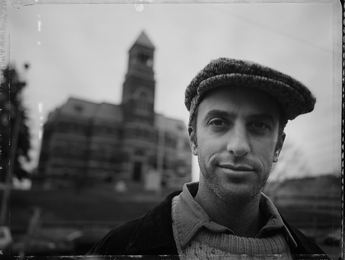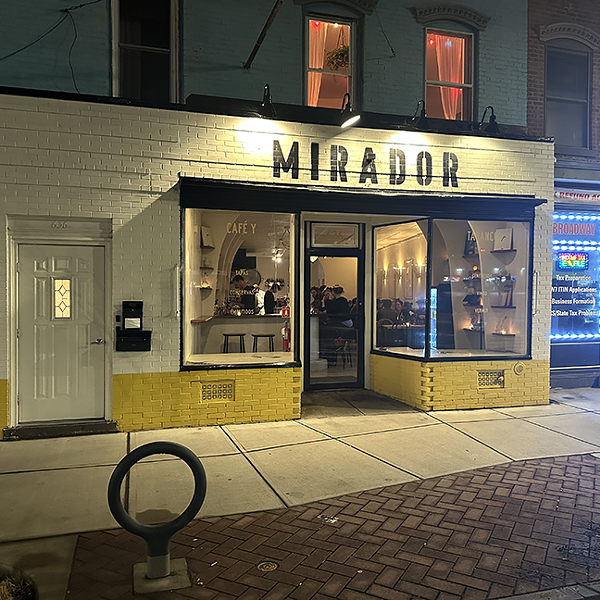“I didn’t know it was going to be like that until after I’d started it,” says Snyder about his second solo disc (this one on his own Bare Bones label) since his leaving critically exalted Hudson Valley band Mercury Rev in 2000. “I already had some of the songs written and then I noticed a theme was developing, and at some point it became an album about Kingston.”
Anyone who knows Snyder, however, will tell you the subject matter is not really a surprise for the 40-year-old singer and multi-instrumentalist. Around town he’s known as a tireless crusader for the former state capital, especially on issues related to sensible development and sustainability, an active dynamo who belongs to neighborhood advocacy groups and frequently turns up at city hall to speak out at public meetings. (It’s no coincidence he tapped Kingston City Hall as the site of his record release gig.) Also an obsessive student of regional history, Snyder draws on local lore for the voices of the ghosts of Kingston’s past that populate his new record. “These songs came out of me with the same force of a breakup song or a love song,” he says. “They were essential. I had to write them.”
Be thankful he did. This Town Will Get Its Due plays like a box of chocolates left in the rain on Valentine’s Day. Inside: sweet morsels of sadness like the migrant-worker confessional “Trickle Down” and gospel-tinged weepers like the title track and “Down the River” warm the bones like The Band or Willie Nelson’s Red Headed Stranger. It’s a beautifully low-key album, full of soul-baring narratives wrapped in rustic intimacy.
In an underdog town, Snyder lives in one of its true underdog quarters: the Rondout. Once the rough-and-tumble waterfront province of Irish and German canal diggers, ice cutters, dock workers, brick makers, and brewers, the area was a city unto itself before being incorporated with Kingston proper in 1872. Throughout the 1960s and ’70s it was a buffetlike tableau of drugs and prostitution but during the ’90s urban pioneers and West Strand restaurateurs began moving in and revitalizing the neighborhood, which is now a prime nightlife district. If there are ghosts to be found in Kingston, they are most certainly here, in Snyder’s stoic, two-story 1850s brick house.
So what about those spirits, then, like the one of Mickey Finn, the boy in the defiantly upbeat, thrummed-acoustic “Snake Hill” who floats across the creek in a truck tire as he contemplates the Rondout’s impending demise at the hands of developers? Is there a real Snake Hill?
“Sure is. Come and take a look,” Snyder says. Leading the way past a sprawling, wall-mounted period map of the city and out onto his raised deck, he points to a modest mound topped with bare trees on the opposite side of the creek. “That’s Snake Hill, right there,” he says. “But Mickey Finn wasn’t a real person. It’s the name of a boy character in a series of stories by Ernest Jerrold, who lived in Kingston in the 1880s. There’s a little bit of myself in that song, too, but I also wanted to use the character of Mickey Finn to talk about how a boy who grew up in the Rondout during the 1800s would feel about developers coming in and knocking down the hill he played on so they could build condos there.”
Since becoming one of its permanent residents in 2000, Snyder has made an even more direct contribution to the Rondout’s renaissance. In February 2006, he and Aimee Gardner opened a gallery on Abeel Street, the Kingston Museum of Contemporary Art, also known as KMoCA (the name is a friendly poke at North Adams’s MASS MoCA). Over the past year, the tiny space has hosted exhibits and performances by a wide range of local and traveling artists and musicians.
Snyder was born in Queens to a Manhattan mother and a Brooklyn father. The family moved to Kingston in 1972. While attending college in Syracuse, he played in a handful of indie-punk bands before returning to the Hudson Valley; from there, he tried to make a go of it as a musician in Memphis, a frustrating proposition. But in 1995, his friends in Mercury Rev came calling in search of a keyboardist (Snyder also plays guitar, bass, accordion, banjo, and other instruments). The band sent a plane ticket and he was soon back in Kingston, rehearsing for overseas tours and in the studio making such gold records as the group’s acknowledged classic, 1998’s Deserter’s Songs.
“Adam really had a lot to do with how well Deserter’s Songs turned out,” says Mercury Rev guitarist Grasshopper. “At that point, we were starting to want to play and write songs in different ways, and he really helped us out with the new ideas we had. Plus, Adam’s like a jukebox, he knows so many songs. We’d be playing one of our own songs and he’d drop in some part of a Stevie Wonder song or something. A different musical reference every night, which was really cool.”
So why, then, did Snyder leave the group in 2000? “Well, looking back on it now, I guess I could’ve stayed and still done my own music as a side project,” he says. “But I was a bit of a control freak back then, and I really wanted complete control of my music and my career. We’re still all friends, though. In fact I did a short tour with Mercury Rev not long ago, just for fun.”
His years with the acclaimed neo-psychedelic act have also led to brief stints as a studio player for New Order and as a touring keyboardist for The Waterboys. In addition to the ’Rev-friendly UK, the latter band’s homeland of Ireland has become a ripe region for Snyder’s own performances, one he toured with great success upon the release of his first solo album, 2001’s more folk-based, appropriately titled Across the Pond (released on David Gray’s HTI Records). “Ireland has what I call a really high PQ, or poetry quotient,” the singer-songwriter says. “Everyone there has some level of poetry in them. If you want to stand up and sing all by yourself, or tell them a story, they want to hear the story. If you want to share an emotion with them, they want to share one with you. They’ve got thousands of years of history of understanding that, and it goes right into the pop world. Even though I was singing some of these songs [about Kingston] to them, they still identified with what I was singing. Like, when I did ‘Ghost Town’ they would get really quiet and listen.”
But despite the warm reception he gets on the Emerald Isle, Snyder seems unlikely to leave the city he champions anytime soon—developers be damned. “We’re witnessing a potentially rapid change here. Because I talk about this stuff, a lot of people equate me with protesters who are totally against development,” Snyder explains. “Sometimes I think it would be easier if I was all one way or the other, either 100 percent for development or 100 percent against it. But, really, I’m somewhere in between. The thing about growth is that even though you can’t stop it from happening, you can at least do it in an intelligent way. I just think there needs to be a dialogue about it.”
For This Town Will Get Its Due, Adam Snyder has taken that dialogue and woven it into a collection of quietly heartrending odes to the tarnished city he refuses to stop believing in. Hearing them will make you a believer too.
Adam Snyder plays with Johnny Wang, Valen, and DJ Lemar Soulflower at the grand opening of Muddy Cup coffeehouse in midtown Kingston on February 9 at 8pm. www.adamsnyder.com; www.kmoca.org.


















